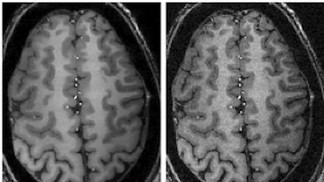Oct 9 2012
A new paper authored by Gilles Puy, José Marques, Rolf Gruetter, Jean-Philippe Thiran, Dimitri Van De Ville, Pierre Vandergheynst and Yves WIaux has been published in the IEEE Trans. on Medical Imaging.
 © 2012 EPFL
© 2012 EPFL
It proposes a new way to acquire and reconstruct MR images, which dramatically speeds-up the image acquisition process.
In this paper we propose a novel compressed sensing technique to accelerate the magnetic resonance imaging (MRI) acquisition process. The method, coined spread spectrum MRI or simply s MRI, consists of premodulating the signal of interest by a linear chirp before random -space under-sampling, and then reconstructing the signal with nonlinear algorithms that promote sparsity. The effectiveness of the procedure is theoretically under-pinned by the optimization of the coherence between the sparsity and sensing bases. The proposed technique is thoroughly studied by means of numerical simulations, as well as phantom and in vivo experiments on a 7T scanner. Our results suggest that s MRI performs better than state-of-the-art variable density-space under-sampling approaches.
Ref : Spread Spectrum Magnetic Resonance Imaging, IEEE TRANSACTIONS ON MEDICAL IMAGING, VOL. 31, NO. 3, MARCH 2012.